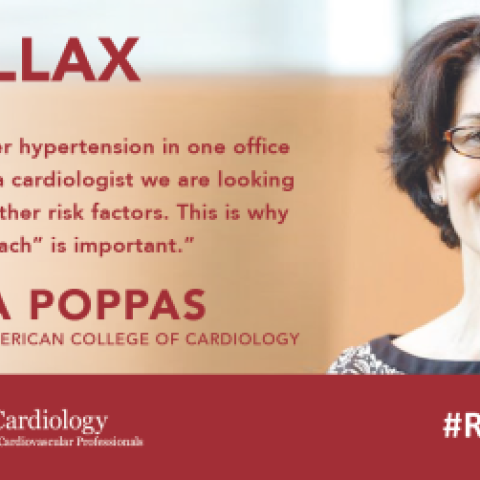
This week’s podcast guest needs no introduction! Prof Athena Poppas is one of the most widely known cardiologists in the US and current Vice-President of the American College of Cardiology! Ankur spoke to Athena about her recently published US Cardiology Review 13.1 article on whether early management of hypertension by GPs can improve outcomes.
They discuss the importance of preventative medicine, their experience of reducing hypertension with non-pharmaceutical and pharmaceutical methods, and the significance of the integrated “team approach” when treating comorbid conditions such as hypertension. Athena also shares her thoughts on cardiologists’ responsibility to shape their patients’ lifestyle choices.
Hosted by @AnkurKalraMD. Produced by @RadcliffeCardiology.

Dawn is an associate editor of the journal Circulation: Cardiovascular Interventions and is widely known for her research program on PCI and peripheral arterial disease (PAD). Ankur and J. Dawn discuss multiple trials/studies that were published in 2018, including ORBITA, PIONEER-II and ABSORB. J. Dawn also shares her thoughts on the latest stent technologies.
Hosted by @AnkurKalraMD. Produced by @RadcliffeCardiology.

Ankur is back with his second #AudioArticle! This week he spoke with Santiago Garcia from the Minneapolis Heart Institute about Santiago’s US Cardiology Review 13.1 article on the role of high-sensitivity cardiac troponin (hscTn) assays and their ability to rapidly rule in or rule out acute coronary syndrome (ACS) with improved sensitivity.
Chest pain is one of the most common reasons for an emergency room visit in the US, with almost 6 million ER visits annually, yet there is no consensus on how to compare the results from various hscTn assays. Tune in to hear Santiago outline the advantages and limitations of using hscTn as a standard biomarket to evaluate patients with suspected ACS in the ER.
Hosted by @AnkurKalraMD. Produced by @RadcliffeCardiology.


Ankur is back with his second #AudioArticle! This week he spoke with Santiago Garcia from the Minneapolis Heart Institute about Santiago’s US Cardiology Review 13.1 article on the role of high-sensitivity cardiac troponin (hscTn) assays and their ability to rapidly rule in or rule out acute coronary syndrome (ACS) with improved sensitivity.
Chest pain is one of the most common reasons for an emergency room visit in the US, with almost 6 million ER visits annually, yet there is no consensus on how to compare the results from various hscTn assays. Tune in to hear Santiago outline the advantages and limitations of using hscTn as a standard biomarket to evaluate patients with suspected ACS in the ER.
Hosted by @AnkurKalraMD. Produced by @RadcliffeCardiology.






